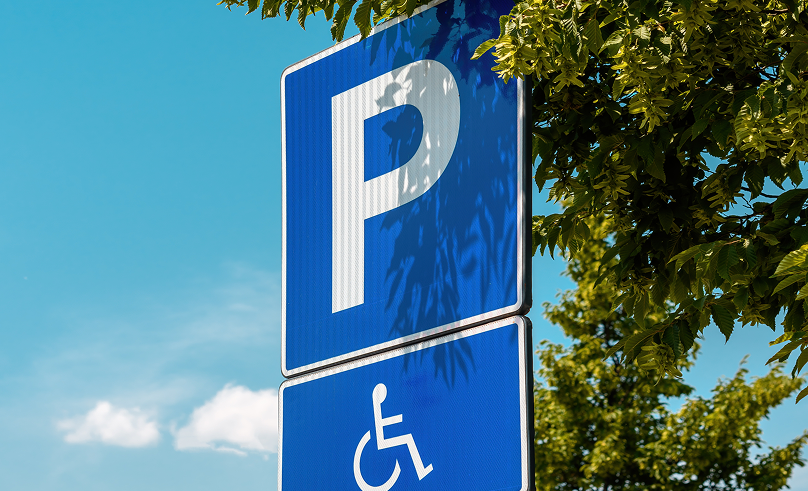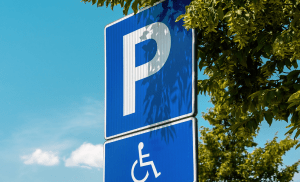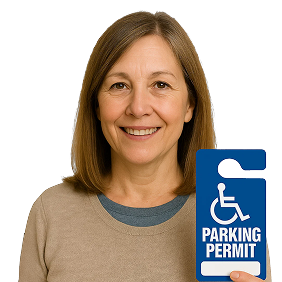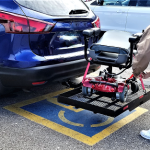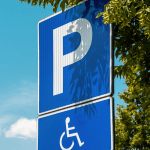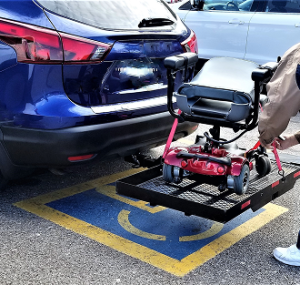Getting a disability parking permit shouldn’t add more challenges to your daily life. If you’re one of the millions of Americans who qualify for accessible parking, you’ll be relieved to know that obtaining your permit has become significantly easier with online medical evaluations and streamlined application processes.
Over 61 million adults in the United States live with a disability, and many of these individuals face mobility challenges that make traditional DMV visits particularly difficult. The good news? You can now complete much of the disability parking permit process from the comfort of your home, eliminating long wait times, multiple trips, and transportation barriers.
In this comprehensive guide, you’ll discover exactly how to get your disability parking permit online, which states offer digital applications, what medical documentation you need, and how services like ParkingMD can connect you with licensed physicians for fast, convenient evaluations. Whether you need a temporary or permanent permit, we’ll walk you through every step of the process.
Ready to skip the DMV lines and get your parking permit the modern way? Let’s dive in.
Understanding Disability Parking Permits
What is a Disability Parking Permit?
A disability parking permit, also known as a handicap placard or accessible parking permit, is an official document that allows individuals with qualifying disabilities to park in designated accessible parking spaces. These permits provide crucial parking privileges including access to spaces with the International Symbol of Access (wheelchair symbol), parking next to blue curbs, extended time at green curbs, and free parking at metered spaces in many locations.
There are several types of disability parking permits available:
Temporary Permits – Issued for short-term disabilities expected to last from one week to eight months, depending on your state. These are ideal for individuals recovering from surgery, injuries, or temporary medical conditions.
Permanent Permits – Valid for four to eight years depending on your state, these are issued to individuals with long-term mobility impairments or permanent disabilities.
Organization Permits – Available to institutions, hospitals, and organizations that regularly transport individuals with disabilities.
Who Qualifies for a Disability Parking Permit?
Understanding eligibility is crucial before beginning your application. You may qualify for a disability parking permit if you have a medical condition that significantly limits your ability to walk or move safely without assistance. Common qualifying conditions include:
Mobility Limitations:
- Difficulty walking 200 feet without stopping to rest
- Use of mobility aids such as a wheelchair, walker, cane, or crutches
- Limb differences or amputations that impact stability while walking
Medical Conditions:
- Heart, lung, or circulatory conditions that cause shortness of breath or fatigue
- Restricted lung function with forced respiratory volume less than one liter, or arterial oxygen tension less than 60 millimeters of mercury on room air
- Neurological or musculoskeletal conditions such as multiple sclerosis, Parkinson’s disease, or arthritis
- Hearing impairments that significantly limit mobility safety
Temporary Conditions:
- Recovery from surgery or injury that affects mobility
- Pregnancy complications requiring modified activity
- Broken bones or injuries requiring mobility aids
Veterans: Veterans with service-connected disabilities certified by the U.S. Department of Veterans Affairs may qualify for special veteran disability permits.
The key requirement across all states is that a licensed physician must evaluate your condition and certify that it meets your state’s requirements for accessible parking.
Traditional vs. Online Application Process
Traditional DMV Process Challenges
For decades, obtaining a disability parking permit meant navigating a complex, time-consuming process that often seemed designed without considering the needs of people with disabilities. The traditional process typically involves:
Multiple In-Person Visits: First to your doctor for medical certification, then to the DMV for application submission, and potentially additional trips if documentation is incomplete.
Long Wait Times: DMV processing can take 90 business days or more, leaving individuals without crucial parking access during the waiting period.
Transportation Barriers: Perhaps most ironically, the traditional process requires individuals with mobility limitations to make multiple trips to various locations, often using inadequate transportation options.
Complex Paperwork: Managing multiple forms, medical certifications, and state-specific requirements can be overwhelming, especially when dealing with health challenges.
Limited Availability: DMV offices operate during standard business hours, making it difficult for working individuals or those dependent on caregivers to complete the process.
Benefits of Online Applications
The digital revolution has transformed how we access healthcare and government services, and disability parking permits are no exception. Online applications and medical evaluations offer significant advantages:
Convenience and Accessibility: Complete your medical evaluation from home using a smartphone, computer, or tablet. No transportation required, no waiting rooms, and no scheduling around limited DMV hours.
Faster Processing: Online medical evaluations typically provide certification within 24 to 48 hours, dramatically reducing the time between application and permit receipt.
Professional Medical Care: Connect with licensed physicians who specialize in disability evaluations and understand the specific requirements for parking permit certification.
Streamlined Documentation: Digital platforms handle form completion, medical record management, and direct submission to appropriate state agencies when possible.
24/7 Availability: Schedule evaluations at times that work for your schedule, including evenings and weekends.
How Online Medical Evaluations Work
Online medical evaluations for disability parking permits follow a structured, professional process that meets all state medical certification requirements:
Secure Platform Access: Licensed telemedicine platforms use HIPAA-compliant technology to protect your personal health information during video or phone consultations.
Licensed Physician Consultation: Connect with doctors licensed in your state who have experience with disability evaluations and parking permit requirements.
Comprehensive Assessment: Physicians review your medical history, current symptoms, mobility limitations, and functional capacity through detailed discussion and visual assessment.
Official Certification: Upon completion of the evaluation, qualified physicians provide the official medical certification required by your state’s DMV, complete with digital signatures and professional credentials.
Step-by-Step Guide: Getting Your Permit Online
Step 1: Check Your State’s Online Options
Before beginning your application, it’s essential to understand your state’s specific requirements and available online options. States generally fall into three categories:
States with Full Online Applications: States like Connecticut, California, and Michigan offer complete online application processes where you can submit everything digitally.
States with Online Medical Evaluations: Most states accept medical certifications from licensed telemedicine providers, allowing you to complete the medical evaluation online while submitting the final application through traditional channels.
States Requiring Hybrid Approaches: Some states like New Jersey require in-person submission to municipal police departments for temporary permits, but still accept online medical certifications.
Key State Examples:
- California: Offers complete online applications through their DMV portal, with digital form submission and processing
- Connecticut: Provides comprehensive online applications for residents, non-residents, and qualifying veterans
- Washington: Offers online temporary permit applications and accepts online medical evaluations for permanent permits
- Michigan: Allows online renewals and replacements, with growing acceptance of telemedicine evaluations
Step 2: Gather Required Documents
Proper preparation ensures a smooth application process. While specific requirements vary by state, most applications require:
Personal Identification:
- Government-issued photo ID (driver’s license or state ID card)
- Some states accept alternative identification for individuals unable to visit DMV offices due to disability severity
Residency Verification:
- Proof of current address (utility bills, lease agreements, or official mail)
- Some states require specific residency documentation periods
Vehicle Information:
- Current vehicle registration (if applying for disability license plates)
- A maximum of three vehicle registrations for permit applications in most states
Medical Documentation:
- Recent medical records supporting your disability claim
- List of current medications related to your condition
- Documentation of mobility aids or assistive devices used
Previous Permits:
- Current or expired disability permits if applying for renewal
- Identification numbers from previous permits
Step 3: Complete Online Medical Evaluation
The medical evaluation is the cornerstone of your disability parking permit application. Here’s what to expect:
Choosing a Provider: Select a reputable telemedicine platform like ParkingMD that employs licensed physicians in your state and specializes in disability evaluations.
Scheduling Your Consultation: Book an appointment that fits your schedule, with many providers offering same-day or next-day availability.
Technology Requirements: Ensure you have a stable internet connection and access to a device with video capability (smartphone, tablet, or computer with webcam).
During the Evaluation:
- Discuss your medical history and current symptoms
- Explain how your condition affects daily mobility
- Demonstrate functional limitations as appropriate
- Answer questions about distance walking, stair climbing, and balance
- Review current treatments and mobility aids
Medical Assessment: Licensed physicians evaluate your condition against state-specific criteria for disability parking eligibility, ensuring your situation meets legal requirements.
Step 4: Physician Certification Process
Once your evaluation is complete, the certification process begins:
Medical Criteria Assessment: Physicians must certify that your condition significantly limits your ability to walk or move safely without assistance.
Official Documentation: Doctors complete state-required forms with professional medical opinions, diagnosis codes, and duration of disability.
Digital Signatures: Licensed physicians provide legally valid digital signatures that state DMV offices recognize and accept.
Processing Time: Most online evaluations provide medical certification within 24 to 48 hours, significantly faster than traditional doctor visits.
Quality Assurance: Reputable platforms review all certifications for accuracy and completeness before delivery to ensure smooth DMV processing.
Step 5: Submit to Your State’s DMV
With your medical certification in hand, you’re ready to submit your complete application:
Online Submission States: Upload your documents directly through your state’s DMV website or online portal.
Mail-in Applications: Many states accept mailed applications with original medical certifications and required documentation.
Required Forms: Complete your state’s specific disability parking permit application form, available on DMV websites.
Processing Fees: Most states offer disability parking permits at no charge, though some charge nominal fees for replacement or expedited processing.
Application Tracking: Many states provide online tracking systems to monitor your application status and processing timeline.
Step 6: Receive Your Permit
The final step is receiving and properly using your disability parking permit:
Delivery Methods: Permits are typically mailed to your registered address or available for pickup at DMV offices.
Processing Timeframes: After DMV receives your complete application, permits are usually issued within days to a few weeks, depending on your state.
Permit Types: Receive either a hanging placard for use in any vehicle or disability license plates for specific vehicles.
Identification Cards: Many states include identification cards that must be carried when using disability parking privileges.
Usage Instructions: Learn proper display methods, valid parking locations, and legal requirements for permit use.
State-by-State Online Application Guide
States with Full Online Applications
Several progressive states have embraced digital government services, offering complete online disability parking permit applications:
California: The California DMV provides a comprehensive online application system where eligible residents can complete the entire process digitally, from medical evaluation to permit issuance. The state also offers automatic renewal systems for permanent permits, with online signature options for existing permit holders.
Connecticut: Connecticut offers one of the most user-friendly online systems, accepting applications from residents, non-residents under qualifying conditions, and veterans with service-connected disabilities. Their system includes built-in guidance for required documentation and real-time application status updates.
Washington State: Washington provides online applications for temporary permits and accepts online medical evaluations for permanent permits, with processing times of 2-3 weeks and automatic ID card mailing.
Michigan: Michigan’s online system excels in renewal and replacement services, allowing existing permit holders to manage their accounts digitally while expanding acceptance of telemedicine evaluations for new applications.
States with Online Medical Evaluations
Most states that haven’t implemented full online applications still accept medical certifications from licensed telemedicine providers, creating hybrid processes that offer significant convenience:
Telemedicine Acceptance: The majority of states recognize medical certifications from licensed physicians practicing telemedicine, provided the doctor is licensed in the state where the permit is being requested.
ParkingMD Integration: Services like ParkingMD work with state regulations to ensure their medical evaluations meet specific state requirements, providing seamless integration with traditional application processes.
Documentation Standards: Online medical evaluations must meet the same professional standards as in-person evaluations, including proper medical assessment, diagnosis documentation, and physician certification.
States Requiring In-Person Visits
While some states still require in-person components, online medical evaluations can still streamline much of the process:
New Jersey Example: New Jersey requires temporary permit applications to be submitted to municipal police departments in person, but accepts online medical certifications from qualified physicians.
Hybrid Solutions: Even in states with in-person requirements, online medical evaluations eliminate the need for separate doctor visits, reducing the total number of trips required.
Future Developments: Many states are actively working to expand online services, with legislative changes regularly updating available digital options.
Special Considerations
Veteran Programs: Many states offer special expedited processing for veterans with service-connected disabilities, often with reduced documentation requirements and fee exemptions.
Temporary vs. Permanent Permits: Processing requirements and renewal schedules vary significantly between temporary permits (typically 1-8 months) and permanent permits (usually 2-8 years).
Interstate Recognition: Most disability parking permits are recognized across state lines, though some states require temporary travel permits for extended visits.
Required Medical Documentation
Medical Conditions Documentation
Successful disability parking permit applications require clear medical documentation that demonstrates your condition meets state eligibility criteria:
Specific Qualifying Conditions: Your medical documentation must clearly identify conditions such as mobility limitations preventing walking 200 feet without rest, cardiac conditions classified as Class III or IV severity, respiratory conditions with forced expiratory volume less than one liter, or severe limitations due to arthritic, neurological, or orthopedic conditions.
Functional Impact Documentation: Rather than simply listing diagnoses, effective medical documentation describes how your condition specifically impacts daily mobility and function.
Treatment History: Include records of ongoing treatments, medications, physical therapy, or surgical interventions related to your mobility limitations.
Mobility Aid Documentation: Document your use of assistive devices such as wheelchairs, walkers, canes, crutches, or prosthetic devices, including when and why these aids are necessary.
Duration and Prognosis: Medical documentation should indicate whether your condition is temporary (with an expected improvement timeline) or permanent (requiring long-term accommodation).
Healthcare Provider Requirements
Not all healthcare providers can certify disability parking permit applications. Understanding who can provide valid certifications ensures your application processes smoothly:
Licensed Physicians: Most states accept certifications from licensed medical doctors (MDs) and doctors of osteopathic medicine (DOs) who are licensed to practice in the state where you’re applying.
Specialist Providers: Many states also accept certifications from physician assistants licensed under medical supervision, advanced practice registered nurses, and in some cases, licensed chiropractors for specific conditions within their scope of practice.
Telemedicine Qualifications: Online medical evaluations must be conducted by physicians who are properly licensed in your state and have experience with disability assessments and parking permit requirements.
Out-of-State Physicians: Some states accept certifications from out-of-state physicians when accompanied by documentation of the physician’s licensure and verification of knowledge about the state’s eligibility guidelines.
Veteran Certification: Veterans may provide alternative certification through VA disability determination letters or Form Letter 27-333 in lieu of traditional medical certification.
Medical Records and History
Preparing comprehensive medical records strengthens your application and demonstrates the legitimacy of your disability claim:
Recent Medical Visits: Include documentation from recent medical appointments that discuss your mobility limitations, treatment plans, and functional assessments.
Diagnostic Test Results: Provide relevant test results such as pulmonary function tests, cardiac stress tests, imaging studies, or neurological assessments that support your disability claim.
Prescription Medications: Document current medications related to your condition, particularly those that affect mobility, balance, or endurance.
Hospital Records: Include relevant hospital stays, emergency room visits, or surgical procedures that relate to your mobility limitations.
Specialist Consultations: Provide records from relevant specialists such as orthopedic surgeons, neurologists, cardiologists, or pulmonologists who have evaluated your condition.
Tips for a Successful Online Application
Preparation Tips
Proper preparation significantly increases your chances of application approval and reduces processing delays:
Document Organization: Gather all required documents before beginning your application. Create digital copies of identification, medical records, and vehicle registration to streamline online submission.
Technology Requirements: Ensure a reliable internet connection and test your video calling capability before scheduling your medical evaluation. Most smartphones, tablets, or computers with webcams work effectively for telemedicine consultations.
Medical Record Accessibility: Have recent medical records, prescription lists, and treatment histories readily available during your online evaluation to provide comprehensive information to the examining physician.
Question Preparation: Think through how your condition affects daily activities, walking distances, balance, and mobility. Be prepared to describe specific functional limitations and their impact on your independence.
Quiet Environment: Schedule your online evaluation in a quiet, private space where you can speak openly about your medical condition without interruptions or privacy concerns.
Common Application Mistakes to Avoid
Learning from common errors helps ensure smooth application processing:
Incomplete Documentation: Submitting applications with missing medical certifications, incomplete forms, or inadequate supporting documentation is the leading cause of application delays and rejections.
Incorrect State Forms: Using outdated application forms or forms from the wrong state can result in automatic rejection. Always download current forms from your state’s official DMV website.
Missing Medical Certifications: Ensure your medical certification is properly signed, dated within required timeframes (usually within 12 months), and includes all state-required information.
Address Discrepancies: Verify that all addresses on your application, identification, and vehicle registration match exactly. Address mismatches can cause significant processing delays.
Inadequate Medical Detail: Provide specific, detailed information about your functional limitations rather than general statements about your condition. Focus on how your disability affects mobility and daily activities.
Following Up on Your Application
Proactive communication can help resolve issues and expedite processing:
Application Tracking: Many states provide online tracking systems where you can monitor application status and identify any issues requiring attention.
Contact Timing: Wait at least 2-3 weeks before contacting the DMV about application status, unless you receive specific requests for additional information.
Documentation Requests: Respond promptly to any requests for additional documentation or clarification. Delays in providing requested information can significantly extend processing times.
Appeal Processes: If your application is denied, understand your state’s appeal process and timeline. Many denials result from incomplete documentation rather than actual ineligibility.
Customer Service: Most state DMV offices provide dedicated customer service for disability parking permit applications, with representatives trained to assist with accessibility needs.
Using ParkingMD for Your Online Evaluation
Why Choose ParkingMD
ParkingMD has emerged as the leading platform for online disability parking permit medical evaluations, offering comprehensive services that address the unique challenges of traditional application processes:
Licensed Physicians in All 50 States: ParkingMD employs a network of licensed physicians who understand the specific requirements for disability parking permits in each state, ensuring your evaluation meets all legal and medical standards.
Specialized Expertise: Unlike general telemedicine platforms, ParkingMD physicians specialize in disability evaluations and parking permit requirements, bringing focused expertise to your assessment.
High Approval Rates: With a deep understanding of state requirements and thorough evaluation processes, ParkingMD maintains consistently high approval rates for eligible applicants.
Comprehensive Service: Beyond medical evaluation, ParkingMD provides guidance through the entire application process, helping you understand state requirements and avoid common mistakes.
Accessibility Focus: The platform is designed specifically for individuals with disabilities, offering user-friendly interfaces, flexible scheduling, and accommodations for various accessibility needs.
Conclusion
Getting a disability parking permit no longer requires navigating the frustrating maze of traditional DMV processes. With online medical evaluations and streamlined digital applications, eligible individuals can now obtain their permits more quickly, conveniently, and accessibly than ever before.
The key advantages of the modern online approach are clear: medical evaluations completed within 24-48 hours rather than weeks of waiting for specialist appointments, elimination of multiple trips to medical offices and DMV locations, and professional assessment by physicians who specialize in disability evaluations and understand state requirements.
Whether you’re dealing with a temporary condition following surgery or managing a permanent disability that affects your mobility, online platforms like ParkingMD have revolutionized access to this essential accommodation. The process respects your time, acknowledges your mobility challenges, and provides the professional medical assessment required for legal permit issuance.
Don’t let traditional barriers prevent you from accessing the parking accommodations you need and deserve. If you meet the eligibility requirements for a disability parking permit, take advantage of modern online evaluation services to streamline your application process.
Frequently Asked Questions
Can I use an online evaluation in my state?
Most states accept medical certifications from licensed physicians practicing telemedicine, provided the doctor is licensed in the state where you’re applying for the permit. ParkingMD works with physicians licensed in all 50 states to ensure compliance with local requirements.
How long is the medical certification valid?
Most states require medical certifications to be signed within 12 months prior to application submission. The certification remains valid for your permit’s entire duration, whether temporary or permanent.
What if I’m denied a permit?
Permit denials often result from incomplete documentation rather than actual ineligibility. Most states provide appeal processes where you can submit additional medical evidence or corrected application materials. ParkingMD can help you understand denial reasons and provide additional documentation if needed.
Can I use my permit in other states?
Most disability parking permits are recognized across state lines, though some states have specific requirements for extended visits. Always check local regulations when traveling to ensure compliance with state-specific rules.
How do I renew my permit online?
Many states now offer online renewal processes, particularly for permanent permits. Renewal requirements vary by state, with some requiring new medical certifications and others accepting simple signature confirmations.

